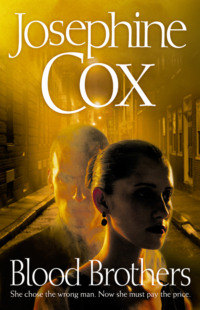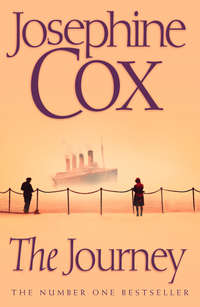
Полная версия
Classic Bestsellers from Josephine Cox: Bumper Collection
‘How dare you!’ In two strides Irene had Samantha by the shoulders. ‘You’re the biggest disappointment of my life. It didn’t matter about Kathy making a mess of her life … it was only what I expected. But you!’ Shaking her hard, she let out a torrent of abuse. ‘I told everyone my daughter Samantha would make something of herself, but you let me down! You humiliated me in front of all my friends. You and her –’ she thumbed a gesture in Kathy’s direction ‘– you make me sick! Failures, the both of you!’
Suppressing her anger, Kathy’s calm voice cut through her mother’s cruel words. ‘You’re right,’ she said. ‘It’s true our marriages didn’t work out. But you’re as much to blame as anyone else. Always interfering … nothing was ever right. Constantly picking fights with Samantha’s husband and mine … causing no end of trouble, excluding them from family; deliberately hounding them, until in the end they had no choice but to leave us. No man on God’s earth would put up with what they had to put up with.’
‘That’s not true!’ Samantha now defended her mother from Kathy’s anger. ‘Mother’s right. They were weak and cowardly, or they would have stayed with us, no matter what.’ Samantha had married an American GI at the end of the war in a whirlwind romance. When Samantha had refused to go to Germany with him after the war, the marriage had stood little chance.
‘I’m glad they didn’t stay.’ Irene’s feathers had been ruffled but now she composed herself. ‘They were wrong from the beginning, those two.’
‘It’s all in the past, Mother.’ Kathy could never forgive her, but there was nothing to be gained by being at each other’s throats. ‘You said you had something to tell us?’
Looking from one to the other, Irene took a deep breath. ‘There are things you should know –’ she glanced at Kathy ‘– about your father.’ Clearing her throat, she collected the document-case papers from the table. ‘In here are keys and the deeds to Barden House. It’s a place in West Bay, Dorset.’
Her face stiffened. ‘I didn’t even know it existed until I was looking through your father’s papers. I also found letters – intimate love-letters; hordes of them – from some woman who signed herself as Liz.’
Bristling with indignation, she directed her hurtful words to Kathy in particular. ‘The truth is, your father was not the innocent you thought he was. He and this woman apparently had an affair and, judging by those letters, it went on for some considerable time. When he was away from home – when I believed he was working – he was with her, in that house! The two of them … in their little love-nest!’
Shocked and confused, Kathy was stunned into silence, while Samantha began to laugh. ‘The old so-and-so … carrying on behind your back. Well, I never!’
In a gesture of disgust, Irene thrust the folder at Kathy. ‘What do you think of your precious father now? He wasn’t the caring man you always thought he was. Instead, he was a cheat and a liar, and I want nothing that was his! Go on, take them: the house, the letters, too. They’re yours. Sell the house, burn it down, I don’t care.’
In an almost inaudible voice, she made a confession. ‘I went there … to West Bay. I was curious. I thought maybe it was her he’d bought the house for … that she was still living there. But it seems the house stood empty for months on end before I turned up. I learned a lot when I asked about. You’d be amazed how much people know in a small place like that.’
Her voice trembled with emotion. ‘At first I thought I might be able to sell the place. I suspected it would be a grand house, filled with expensive furniture that she’d cajoled him into buying. I was wrong. It’s just a horrid, poky little place, filled with cheap, rubbishy things I wouldn’t even put in my shed. The gardens are all overgrown, and the windows are already beginning to rot. I have no use for it, just like I had no use for your father.’
A look of regret crossed her features. ‘Besides, when I took a closer look at the deeds I realised I couldn’t sell it anyway … You see, he bought the house in your name! I was furious. I locked the deeds and letters away and tried to forget about it. Now, though, I want rid of everything that reminds me of him.’
‘It’s not fair!’ Samantha was beside herself. ‘What about me?’ she demanded. ‘She gets a house by the coast. But what do I get?’
Ignoring her, Irene was intent on Kathy. ‘I want you to go now,’ she told her in a cold, quiet voice, ‘and don’t bother coming back.’
Shaken by events, Kathy looked up; at this woman who was her mother … her tormentor, and she felt a wave of relief that somehow it was over … all the pain and heartache she had endured because of this heartless creature. It was over and, for the moment, it was all she could think of.
Kathy turned to Samantha, that haughty creature who was her mother in the making. Suddenly she pitied her. ‘Take care of yourself, Sam,’ she said.
Samantha didn’t answer. Instead she deliberately looked away. But it didn’t matter. Not any more.
As she stood in the hall pulling on her coat, Kathy heard her mother reassuring Samantha. ‘You know I would never let you down. Once I have Richard’s ring on my finger, this house will be yours. It’s all agreed … ready to be signed and sealed. I don’t need it – nor my jewellery – everything your father ever bought me. I’ve got plenty of money tucked away, and Richard will take good care of me. The jewellery’s worth a small fortune, my dear. Sell it all,’ she urged, ‘and you’ll be a rich woman.’
Anxious now to get away, Kathy quickened her steps, the sound of Samantha’s laughter echoing in her troubled mind.
Maggie was already walking away from the spot where they were supposed to meet. Kathy picked out her distinctive black hair and yellow coat. ‘MAGGIE … WAIT!’ Chasing after her, Kathy was relieved she’d caught her. The last thing she wanted right now was to be with a crowd.
Maggie was delighted to see her. ‘I wasn’t sure whether you’d have gone straight to the Palais by now.’
Kathy shook her head. ‘I’m not in the mood for going,’ she confessed. ‘I thought I’d come here on the off-chance you might still be waiting … otherwise I would have gone to the Palais and begged off.’
‘Well, it’s a good job I waited another ten minutes, ain’t it, gal?’
‘I’m sorry it took so long, Maggie.’ As Maggie continued with her to the bus stop, Kathy drew her to a halt. ‘Look, Mags, if it’s okay with you, I need to talk.’ When it came right down to it, she had no one else but Maggie to confide in.
Maggie didn’t hesitate. ‘Okay by me.’ She had already noticed how anxious Kathy seemed. ‘What’s wrong?’
Hooking her arm in Maggie’s, Kathy walked her along the street. ‘There’s that quiet little pub on Albert Street,’ she suggested. ‘We can talk there.’
Being Saturday night, there were more people in the pub than Kathy would have liked. ‘We’d best sit over there.’ Maggie pointed to a table by the window; on its own and some way from the bar, it seemed an ideal place to talk. ‘You go and sit down. I’ll get us a drink … half a pint o’ shandy, is it, gal?’ she asked. ‘Same as usual?’
Kathy nodded. ‘Thanks, Maggie.’
While Kathy settled herself at the table, Maggie brought the drinks. ‘There y’are, gal … get that down you.’
Maggie settled in her seat, took a swig of her Babycham, and asked, ‘Your mother been giving you trouble again, has she?’
‘You could say that. She’s full of herself as usual. Planning to marry an old business rival of Dad’s. She says she’s lonely, but I think she’s hoping he’ll “pop his clogs” soon after so she can inherit his vast fortune. The upshot is, Samantha is being given the house and everything that’s worth anything.’
‘Well, the old cow! No wonder you’re down in the dumps.’
‘No, Mags. You’ve got it all wrong.’ None of that mattered to Kathy. ‘It’s not important. It isn’t that I need to talk about.’
Maggie pointed to the document case lying on the table. ‘It’s to do with that, ain’t it, gal?’ She had seen how carefully Kathy handled the case, laying it in front of her and never taking her eyes off it.
Kathy nodded. ‘She gave it to me.’
Opening the case, she drew out the house deeds, but left the letters inside. ‘Look at that.’ Handing the deeds to Maggie, she waited for her reaction.
After perusing the document, Maggie was delighted for Kathy, but confused by the meaning of it all. ‘It’s a house!’ she exclaimed. ‘In your name. But that’s wonderful.’ Seeing that Kathy seemed a little sad, she asked lamely, ‘Ain’t it?’
Kathy told her the whole story … of how her mother had taken great delight in tearing her father’s memory to shreds. She told her about the house in West Bay, and the woman called Liz, and the love-letters that her mother had read and that she herself could never read. She explained how she still found it hard to believe that her father had kept a secret lover for such a long time, and that she never even suspected. ‘Oh, Maggie, why didn’t he tell me?’
‘Because he loved you, that’s why.’ Maggie hated what Kathy’s mother had done to her: whenever she came into Kathy’s life she always seemed to take delight in turning it upside down. ‘He knew how much you loved him, and he didn’t want to spoil that. Happen he thought you would think badly of him, or he felt ashamed in some way that he had the need to go outside his marriage for love and affection.’
Reaching out, she laid her hand over Kathy’s. ‘Look, gal. I know this must all have come as a terrible shock to you, but don’t let it spoil all them special memories of your dad. He was a lovely man. All right! So he set up a love-nest with this “Liz” … and he never told anybody, not even you. But it doesn’t mean he couldn’t trust you.’
Kathy had already told herself all that. ‘I know,’ she said, ‘and I don’t blame him for what he did … any man would if he had my mother to put up with!’ The hatred of her mother trembled in her voice. ‘Whatever he did, she drove him to it, and if that was the only happiness he could find, then I’m glad for him.’
When the tears began to smart in her eyes, she took a minute for the emotion to subside. ‘She won’t spoil my memories. I won’t let her.’
Maggie understood. ‘I’m sorry, gal.’ Maggie’s heart went out to her. ‘But he never stopped loving you, did he, eh? ’Cause he even bought the house in your name. That tells you summat, don’t it, eh?’
Kathy had wondered about that, and she voiced her questions to Maggie. ‘Why would he do that? If he found happiness and comfort with this … Liz, why didn’t he buy the house in her name?’
Maggie shrugged. ‘Who knows? Maybe she’s rich and doesn’t need it. But for what it’s worth, I think he was trying to tell you something.’ She dropped her voice to a whisper. ‘I think he was trying to tell you how happy he was with her. I think he wanted you to have the house … because he hoped you might go there and maybe find the same happiness he had.’
Kathy smiled. ‘I thought that too,’ she admitted. ‘On the trolleybus coming over, I tried to make sense of it all, and I thought the same as you: that he wanted me to have the house, because he loved it so, and because he hoped I might love it too.’ Close to tears, her heart swelled with love for him. ‘I’m not upset or angry with him,’ she said, ‘I’m just so glad he found happiness, because I know he didn’t have that with Mother.’
She gave a wry little smile. ‘It was just such a shock. I never knew he had it in him to do something like that. In a way I admire him … more than ever. It shows he had the guts to take the chance of happiness when he saw it.’
She recalled how her mother had gone to West Bay, looking for the woman. ‘She said the house was a “poky” place … filled with rubbishy furniture she “wouldn’t even put in her shed”.’
‘Ah, well, that’s your mother, ain’t it, gal? If summat didn’t cost a bleedin’ fortune, it ain’t worth having.’
‘Apparently there was no sign of the other woman.’
Maggie laughed. ‘Just as well an’ all, if you ask me! I reckon there’d have been a right cat-fight if them two had got together.’
Kathy didn’t agree. ‘No, Maggie. She would have kept her distance and torn her to shreds with her vicious tongue. That’s Mother’s way. And I should know, because she’s done it to me often enough.’
‘Will you try and find this Liz woman?’
‘I don’t think so.’ Kathy shook her head. ‘To be honest, I would like to,’ she answered, ‘if only to thank her for the happiness she so obviously gave my father. But, to tell you the truth, I don’t think she wants to be found.’ She had given this woman a great deal of thought and had come to that conclusion. ‘Maybe it’s best to let sleeping dogs lie.’
‘What will you do … with the house, I mean?’
‘I’m not sure yet. It’s all too soon.’ She assured Maggie of one thing. ‘I won’t sell it. I couldn’t do that.’ She thought of her father and smiled. ‘It would be like selling his dream.’
Maggie raised her glass. ‘Here’s to your dad,’ she toasted.
Kathy clinked glasses. ‘And his dream,’ she added softly.
That night, when she was all alone with her thoughts and memories, she browsed through the deeds, feeling closer to her father as she turned the worn pages. She touched the letters one by one, but didn’t open them. ‘What was she like, Dad?’ she murmured to his smiling photograph. ‘I would have loved to have met her.’
She cradled the letters and thought of when her father was alive, and sobbed until her heart ached.
It was a long time before she fell asleep, but before she did, her mind was made up. ‘It’s time to make some changes. I’ll give up my job and go to West Bay,’ she murmured to herself.
And, having decided that, she felt more at peace than she had done for a very long time.
Chapter 3
IT WAS EIGHT O’CLOCK in the evening on Friday 12 July, 1952; the sun was beginning to drop in the skies and, along the coast, a rising breeze cooled the air.
After a long drive taking some six and a half hours, Tom headed his little two-door Morris Minor into the sleepy seaside hamlet of West Bay.
Drawing into a curve alongside the road, he slipped the car out of gear and left the engine ticking over while he looked at the directions that he’d scribbled down. John Martin had stayed down here just after the war, and had recommended both the place and a guest-house. ‘Turn left when you come off the main road … follow the signs to West Bay. You’ll find “River View” on your right … there’s a big sign at the gateway. If you come into the harbour, you’ve gone too far.’
Looking about him, Tom took stock of his surroundings; from where he was parked he couldn’t quite see the harbour, but there were seagulls everywhere, and somewhere in front of him the tops of sailing masts bobbed up and down against the skyline. There was a fishmonger’s to his left and a pub to his right, but not a soul in sight. ‘Where the devil am I?’ he wondered aloud.
Taking another look at John’s instructions, he groaned. ‘I’ve missed the guest-house,’ he realised. ‘I’ll have to go back.’
He almost leapt out of his skin when an old man tapped on the window. ‘Got lost, ’ave yer, son?’ With a shaggy beard, a drooping moustache and a flat cap that covered almost all the top half of his features, the man resembled an old sheepdog. His face was weathered and jolly, and his expression endearing.
‘I’ ope yer don’t mind, only I saw yer lookin’ at yer map.’ His merry blue eyes crinkled into a smile. ‘Where is it yer looking for?’ His homely Lancastrian accent was a pleasant surprise. He obviously wasn’t from round here originally.
Weary and peckish, Tom was grateful for any help he could get. ‘Thank you, and yes, it seems I have got lost.’ Pointing to the paper in his hand, he told the old fella, ‘I’m looking for “River View”, only I seem to have missed it.’ Holding up the paper so the old man could see the writing, he went on, ‘It says here, if I can see the harbour, I’ve gone too far.’
‘I see!’ Showing a row of crooked white teeth, the old fella laughed. ‘Well if yer looking for “River View”, you’ll be a long time afore yer find it, ’cause it ain’t there no more.’
Tom was horrified. ‘Why? What do you mean?’
‘Ah, well now … I can see you ain’t got that in them-there directions, so yer can think yersel’ lucky to ’ave come across me. You see, whoever told you to head for that place couldn’t know it were burned down three year back. Afterwards, the ground was sold off, they cleared the old building and built a pub. But they do board and lodgings, if that’s what yer looking for.’
Tom was relieved. ‘Thank God for that! I’m starving hungry.’ He explained, ‘I’ve just driven all the way from London … stopped at Brownhill for drinks and a bite to eat, but I could really do with a bath and a proper hot meal.’ Moreover, he ached through every bone in his body.
The old fellow dashed his hopes straight off. Pursing his lips, he tutted and sighed and warned in a low, ominous voice, ‘They do say as folks only ever stay one night there … summat about –’ he rolled his eyes – ‘ghosts.’
Tom laughed. ‘The way I feel right now, I don’t think ghosts would worry me one bit.’
Disappointed, the old chap straightened up. ‘Please yerself, son. Are you planning to stay a while?’
Tom nodded. ‘I hope to,’ he said. ‘Only, I need a few days’ grace, so I can look round to find a place to rent – long-term – until I sort myself out.’
‘Well, I never!’ The old chap gave a kind of whoop. ‘That’s it, then! Your troubles are over.’
Intrigued, Tom questioned him. ‘How d’you mean?’
‘Why! Cliff Cottage, o’ course. It’s a pretty little place right atop the hill there, warm and cosy, and you’ll wake up to the sound of seagulls calling and a view straight from heaven …’ Pointing towards the far side of the harbour, he explained, ‘It’s owned by a lady who spends most of her time in Ireland … or is it Scotland?’ He scratched his head and pondered, but his memory wasn’t what it once was. ‘Anyroad, now she’s gone away … put the place up for rent, she has. I swear, you’ll not get a prettier place to live, if you tramped the world twice over.’
Excited, Tom got out of the car to shake his hand. ‘It sounds perfect!’ he said. ‘Who do I see about renting it?’
The old man puffed out his chest. ‘You see me, son, that’s who yer see. I’m the fella yer want!’ Holding out his hand in greeting, he told Tom proudly, ‘The name’s Jasper … Jasper Hardcastle. I’m working hand-in-glove with the agent. I’m entrusted with a key to the property, so I can take you there now if you’ve a mind?’
The old chap was so naturally friendly, Tom had taken to him straight off; in fact, he began to feel as if he’d known him for years. ‘Right then! It sounds good to me. You’d best climb in the car.’
As they drove through the harbour and along the promenade towards the upper ground, Tom commented on the beauty of West Bay: the harbour filled with boats of every size and colour, the curving promenade, and that wonderful view out to sea. ‘It’s just what I need,’ he confessed. ‘A year or so away from the hustle and bustle of London … some time to myself, a place where I can get things into perspective.’
‘That’s the very reason I came here forty-five year ago.’ The old fellow gave a colourful account of himself. ‘I lived me younger days in Darwen … in the North,’ he revealed. ‘I were twenty-eight year old, been wed just a year when I lost me darling wife – pneumonia, it were.’ His voice dropped as though he was talking to himself. ‘Wicked business! She were seven month gone with our first babby.’
Tom could feel his pain; it was much like his own. ‘I’m so sorry,’ he murmured.
‘Aw, no!’ Jasper bucked up. ‘It were a long time ago. But, like I were saying, I’d been to West Bay as a lad with me mam and dad … had the time o’ me life, I did, an’ I never forgot. Well, I just kinda wandered back, if yer know what I mean … got casual work wherever I could: helping the fishermen; serving at the pub; a bit o’ gardening ’ere and there. I were a handyman then, an’ I’ve been a handyman ever since. Helped out where I could during the war, being as I were too old to fight in it.’ He chuckled. ‘An’ I’ve never regretted one minute of it. The more I stayed, the harder it got to leave. There’s a kinda magic about the place that wraps itself round yer. Teks a hold on yer heart an’ won’t let go.’ He laughed. ‘Mind it don’t get you the same way.’
‘Right now, I wouldn’t care if it did,’ Tom confessed. He glanced at the old chap, thinking he looked extraordinarily well for his age, and he told him so.
‘Ah, well, that’s ’cause I’m allus on the go. Seventy-three year old, an’ I’ve never once had to see the doctor … except to register, o’ course, an’ I broke a toe once but it soon mended.’
‘You’re a lucky man, Jasper, to be so content.’ Tom had forgotten how that felt.
Jasper’s response was a question. ‘You never did tell me yer name, sir?’
Tom laughed. ‘Well, I can tell you one thing,’ he chided, ‘it’s not “sir”!’ Taking one hand off the steering-wheel, he grabbed Jasper’s outstretched hand. ‘The name’s Tom Arnold, and I’m ready for some of that “magic” you were just talking about.’
The old man pointed ahead. ‘There she is: Cliff Cottage; pretty as a picture.’
Tom looked, and what he saw took his breath away. With thatched roof and white-painted walls festooned with masses of climbing roses of every hue and colour, it looked enchanting. ‘My God! It’s perfect!’ The cottage was bigger than he had thought, and as they drew up in front of it, he could see the well-tended gardens stretching back as far as the eye could see.
Getting out of the car, Jasper led Tom through the small white gate, and along the flower-lined path. ‘I know this place inside out,’ he imparted proudly. ‘I tend the gardens … clean the windows, and last summer I painted the whole house from top to bottom.’
The more Jasper told him, the more Tom thought how, like the cottage, the old fellow was amazing.
‘Right then, Tom Arnold, let’s see what yer think o’ the inside.’ Taking a key from his waistcoat pocket, Jasper slotted it in the lock and, turning with a flourish, he swung open the door. ‘In yer go!’
Stepping back to allow Tom by, the old fellow followed, giving detailed commentary as they went from room to room. ‘This ’ere’s the living room,’ he said. ‘Not so big, mebbe, but like I said, it’s cosy and warm, and of a winter evening the glow from the fire throws out a cheer … an’ there’s a whole supply o’ logs in the woodshed … small-chopped and neatly stacked.’
Tom’s gaze roved over the room; with two windows, one facing west, the other south, the light poured in and filled the room with evening sunshine. Surrounded by clean blue tiles, the fireplace contained a vase of fresh-smelling flowers. ‘That’s my doing, is that.’ The old man caught the look in Tom’s eye. ‘Picked ’em this very morning … must’a known yer were coming.’
He gave a wink, and Tom smiled. ‘I bet there isn’t much you don’t know,’ he declared.
The furniture was good: there was a brown leather sofa on one side of the fireplace, and a matching armchair on the other. The big green rug in front of the fire set the whole room off a treat. Against the back wall stood a small oak dresser, with nothing on top but a large, round china bowl.
The curtains were of plain beige colour but ‘expensive material’, according to Jasper. ‘The lady had good taste,’ he told Tom. ‘A quiet soul she was,’ he imparted fondly, ‘… kind-hearted too.’ He added quietly as an after-thought, ‘She had her troubles too, poor soul.’ When he realised Tom was waiting for him to expand on that remark, he swiftly moved on. ‘Right then, son, here’s the kitchen.’
Tom followed dutifully, sensing that whatever the old chap had been about to say with regard to that ‘kind, quiet lady’ he had thought better of, and that was all right by Tom. He knew from experience that, occasionally, and for whatever reason, there were some things best left unsaid.








